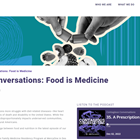On World Aids Day, a renowned HIV/Aids researcher offers insight about the history of the disease and thoughts on moving forward.
Thirty-five years after AIDS was formally recognized, Dr. Leonard Calabrese works to unravel the riddle of HIV/Aids and the immune system.
Calabrese, a 1975 graduate of KCU and current member of the Board of Trustees, has spent his career studying HIV/AIDS and its effects on the immune system, and treating patients with HIV, Hepatitis C and rare autoimmune diseases. In 1981, Dr. Calabrese, a specialist in immunologic disease at the Cleveland Clinic, was asked to see a patient presenting with unusual and grave symptoms. At the time, he wondered if the case had anything to do with his area of expertise.
That patient became the very first person Calabrese treated who suffered from a disease that would become what he calls “the epidemic of our generation,” and change the course of his career.
The disease was Acquired Immune Deficiency Syndrome. Now, 35 years later, Calabrese is as focused on HIV/AIDS as he has ever been.
“The early phase in the ‘80s was tragic,” said Calabrese. “We didn’t understand its transmission, didn’t understand the interaction of lifestyle and behavior. Taking care of the LGBT community wasn’t on anyone’s radar.”
The development of antiretroviral therapy made HIV manageable, noted Calabrese, but the work is far from over. “All these years later, this is still here. We haven’t cured anybody.”
Today, HIV mostly involves the disenfranchised — people of color; those living in poverty, with mental illness or fighting substance abuse; and those who lack resources in medically underserved countries.
The new epidemic of opioid and heroin addiction ups the risk as well.
The keys to managing the disease are early diagnosis, access to drugs, patient support, to make sure they take medication faithfully to avoid developing resistance, and preventing transmission.
Still, many patients whose lives were saved by advances in medication now face premature aging, heart disease and immune system disorders that stem from inflammation.
“The sense of urgency is difficult to keep up, but we can’t become complacent,” he warned. “The big challenge now, he said, is solving the immunological riddle of the disease and figuring out how to reconstitute the immune system. Calabrese is determined to answer that riddle.
_20230426211432_0.jpg?w=140&h=140)

